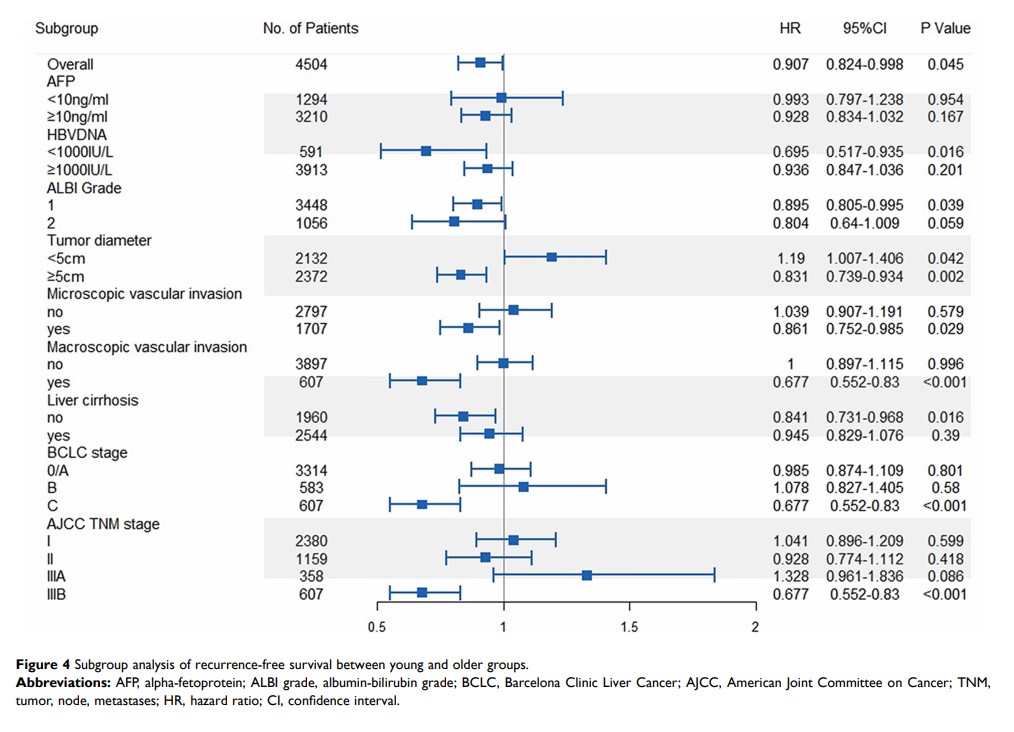109814
论文已发表
注册即可获取德孚的最新动态
IF 收录期刊
- 3.4 Breast Cancer (Dove Med Press)
- 3.2 Clin Epidemiol
- 2.6 Cancer Manag Res
- 2.9 Infect Drug Resist
- 3.7 Clin Interv Aging
- 5.1 Drug Des Dev Ther
- 3.1 Int J Chronic Obstr
- 6.6 Int J Nanomed
- 2.6 Int J Women's Health
- 2.9 Neuropsych Dis Treat
- 2.8 OncoTargets Ther
- 2.0 Patient Prefer Adher
- 2.2 Ther Clin Risk Manag
- 2.5 J Pain Res
- 3.0 Diabet Metab Synd Ob
- 3.2 Psychol Res Behav Ma
- 3.4 Nat Sci Sleep
- 1.8 Pharmgenomics Pers Med
- 2.0 Risk Manag Healthc Policy
- 4.1 J Inflamm Res
- 2.0 Int J Gen Med
- 3.4 J Hepatocell Carcinoma
- 3.0 J Asthma Allergy
- 2.2 Clin Cosmet Investig Dermatol
- 2.4 J Multidiscip Healthc

接受根治性切除术的乙型肝炎病毒相关肝细胞癌年轻患者的预后因素:一项多中心研究
Authors Zeng J, Lin K, Liu H, Huang Y, Guo P, Zeng Y, Zeng J, Liu J
Received 9 May 2020
Accepted for publication 30 June 2020
Published 30 July 2020 Volume 2020:12 Pages 6597—6606
DOI https://doi.org/10.2147/CMAR.S261368
Checked for plagiarism Yes
Review by Single anonymous peer review
Peer reviewer comments 3
Editor who approved publication: Dr Eileen O'Reilly
Background: The prognosis of young and older patients with hepatocellular carcinoma (HCC) is controversial. We aim to compare the clinicopathological features and prognosis of young (age ≤ 40 years) versus older patients (aged > 40 years) with hepatitis B virus (HBV)-related HCC after curative resection.
Methods: A total of 4504 patients with HBV-related HCC who underwent curative resection were included in this study and divided into young group (n=699) and older group (n=3805). Subgroup analyses were conducted to compare. Independent risk factors were identified by Cox regression analysis.
Results: Young patients had better ALBI grade, lower rates of liver cirrhosis, higher rates of elevated serum AFP levels, larger tumor size, higher rates of microvascular invasion and macrovascular invasion, higher rates of Edmondson grade III–IV, lower rates of tumor capsular, more advanced AJCC TNM stages and more advanced BCLC stages than older patients (All p< 0.05). Meanwhile, young patients had a worse overall survival (OS) rate (p=0.0091) and a worse recurrence-free survival (RFS) rate (p=0.045) than older patients. Multivariate analysis revealed that AFP, resection margin, tumor size, tumor capsular, and macrovascular invasion were associated with OS. The independent risk factors associated with RFS were ALB, tumor size, microvascular invasion, and macrovascular invasion.
Conclusion: Young patients had better liver function, more aggressive tumor characteristics, and worse prognosis than older patients. A tumor size of ≥ 5 cm and macrovascular invasion were associated with poor OS and RFS in young patients. If tumors could be detected at the early stage by more frequent surveillance, long-term survival can be expected in the young patients.
Keywords: hepatocellular carcinoma, young, older, hepatectomy, prognosis
